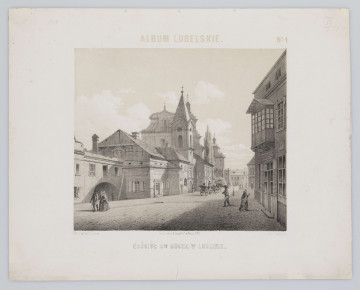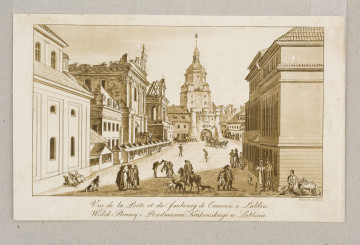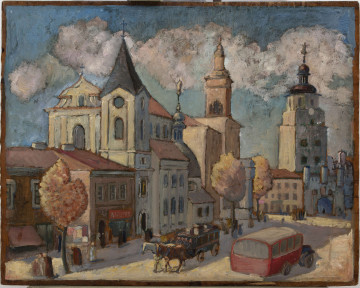
Church and hospital at Krakowskie Przedmieście
1857
National Museum in Lublin
Part of the collection: Lubliniana. Painting views of Lublin and the Lublin Region
Leon Urmowski was probably born in Lviv around 1794, from where he moved to Zamość with his brother, Klemens, and then settled in Lublin around 1809. In 1810, he entered the Elementary Artillery and Engineering School in Warsaw. Already at that time he showed outstanding artistic talent, which was confirmed by the drawings he submitted with his application for admission to the school. Although he did not receive an artistic education, he was able to hone his skills in drawing and topography at the school. In 1812, he participated in the activities of Napoleon's Russian campaign as a soldier and adjutant of the main staff of the 17th Division commanded by General Jan Henryk Dąbrowski. He reported on the first stage of military operations in his diary, in which, in addition to the route, there were descriptions of towns and architectural monuments. His developing military career came to an end with his premature death. Urmowski died in 1814, at the age of about 20, of pulmonary tuberculosis, just 10 months after his return to Lublin. His young age was probably one of the main reasons why few of his works survived. Shortly before his death, he created two views of the city - one with a shot of the Castle Hill, the other showing the Krakowska Gate in the perspective of Krakowskie Przedmieście. Both belong to the type of 19th-century views of Polish architecture associated with the desire to document the mementos of the past, which was supposed to spread knowledge about the native monuments. For centuries the Krakowskie Przedmieście has been the city's most representative thoroughfare. Once called Platea Magna, it was part of the route leading from Krakow to the east. Urmowski concentrated on depicting a fragment of the street leading to the Krakowska Gate, starting from the Holy Spirit Church on the left and the corner tenement at the junction with Bernardyńska Street on the right. In the 1820s, in Krakowskie Przedmieście, on the site of the remains of the burnt-down complex of the Discalced Carmelites, a new seat of the Municipal Office (New City Hall) was erected. The composition is devoid of purely documentary character - the artist has introduced extensive staffage, showing figures of passers-by dressed in elegant clothes and the everyday life of residents focused on their work.
Anna Hałata
Author / creator
Dimensions
cały obiekt: height: 12,8 cm, width: 9,1 cm
Object type
graphics
Technique
Aquarel-coloured etching
Material
paper
Creation time / dating
Creation / finding place
Owner
The National Museum in Lublin
Identification number
Location / status

1857
National Museum in Lublin

1821
National Museum in Lublin

circa 1926-1939
National Museum in Lublin
DISCOVER this TOPIC
National Museum in Lublin
DISCOVER this PATH
Educational path